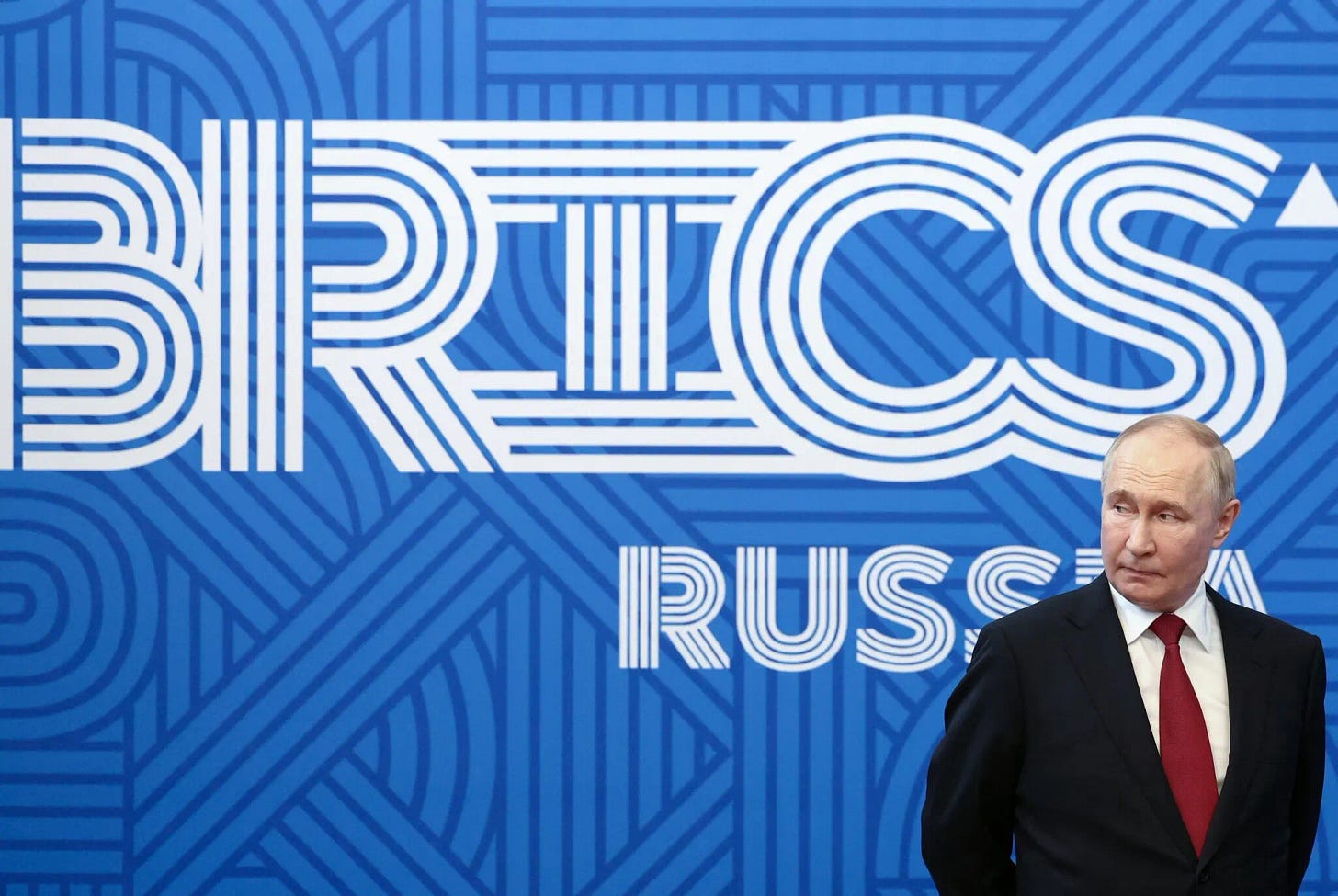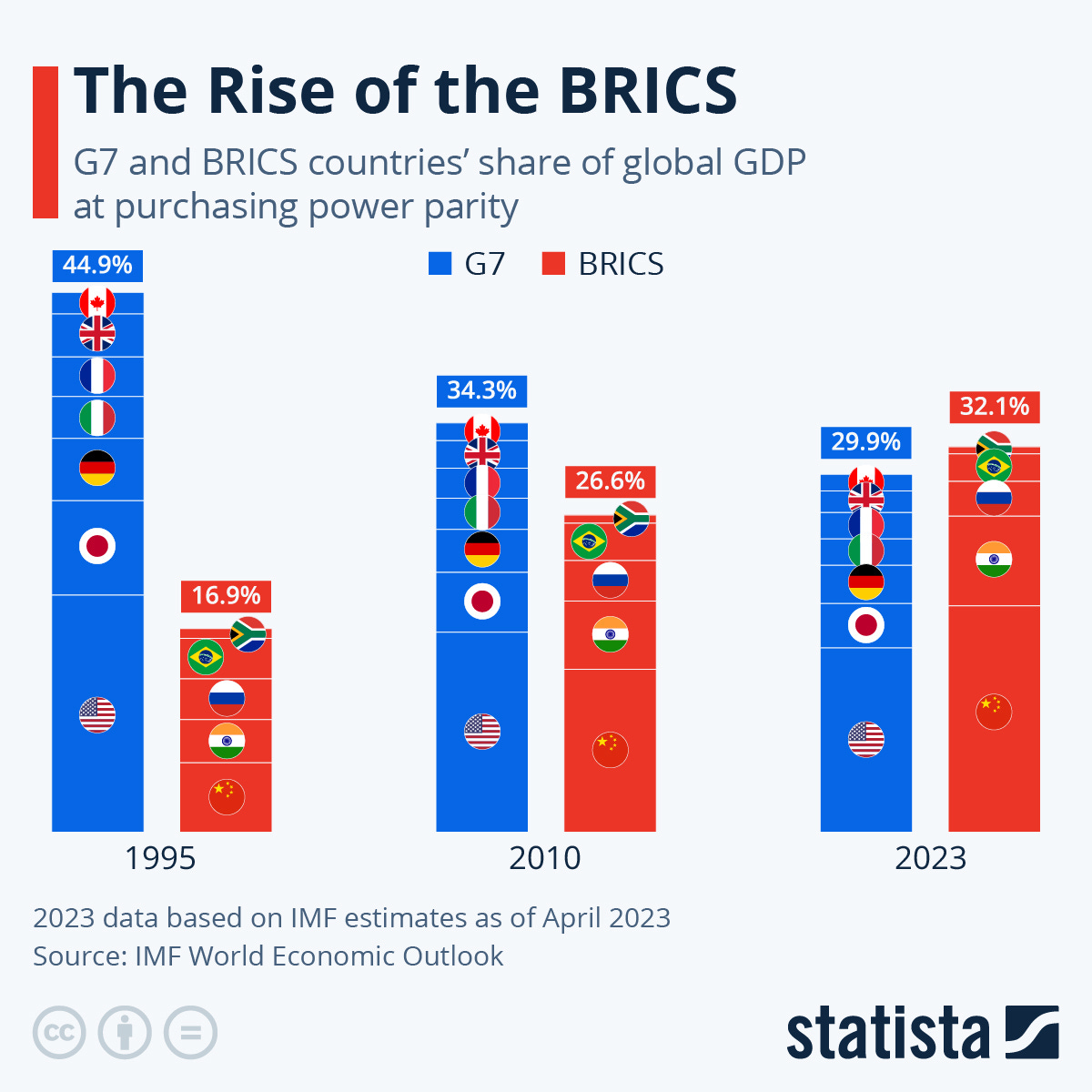The fantasy of Putin weaponizing BRICS
Nobody is self-sabotaging their economic rise to help out Vlad the Terrible
The notion is out there, seeking legs:
NYT: Putin Brings Together Economies He Hopes Will Eclipse the West
Putin himself packages the “impressive” data:
“In the last decade, over 40 percent of the growth in global G.D.P. of the entire world economic dynamics came from the BRICS countries,” Mr. Putin said, asserting that the developed Group of Seven countries is playing a declining role in the global economy.
“The gap is widening, and it will further widen — this is inevitable,” he said.
There are several inevitabilities that Russia is facing, like the aging and shrinking of its population, the warming of its vast landscape making it an attractive takeover target by powers to its south that will suffer climate change far worse, the end of the age of oil, Putin’s successor failing to keep his regime alive once the great man leaves the scene … many scary pathways, to be sure.
But Putin somehow leveraging the BRICS to his salvation or success?
Ain’t happening.
The stats that get thrown out on this are always impressive, but they always reflect the fact that China and India are huge and growing, while the rest of the BRICS are doing meh-to-okay.
Let’s review the tape:
Global GDP Share: As of 2023, BRICS nations account for roughly 30% of the world's GDP, up from 17% in 1995. The bloc is projected to rise further, especially with the addition of new members like Saudi Arabia and Argentina, which will elevate their combined GDP to over $30 trillion. By comparison, the US economy is only … $27-28 trillion right now
[Pause here to shake in one’s boots.]
Purchasing Power Parity (PPP): When measured by purchasing power parity, the BRICS collectively represents about one-third of global GDP, surpassing the G7's share of 30 percent.
But check out those bars and realize that India is already almost three times the size of the Russian economy, while China is still almost three times the size of the Indian economy. Note also that Russia’s size does not really change at all across the past three decades, and today “commands” about 1/25th of the global economy.
So, yeah, impressive coattails to be riding there, Vlad, but that’s all.
But what about population? The BRICS are 45% of the world’s total, of which 34% is just India + China. Russia is 1.8% of the world population, and it’s getting smaller by the year.
It’s really only in energy production that Russia holds its own within the BRICS’ impressive 40% share of global crude oil production and exports. But we all know the story there since Putin invaded Ukraine: Western sanctions means Russia no longer gets top dollar pricing from Europe and instead sells at bargain basement prices to India and China, who now take in 80% of Russia’s oil exports.
Putin is not raking it in on energy. Russia is being abused by its BRICS “partners.”
The BRICS are likewise said to account for 4/10ths of global trade. But that doesn’t translate into any serious trade power for Russia.
From my upcoming second Massive Open Online Course:
Russia is not important in global trade among the five superpowers, with none of those four having to adjust anything to make Moscow happy.
America has to care about its EU market, and China has to care about its access to the EU and US, and India the same. But Russia? It has to keep China happy and that’s it. And we know what generous traders the Chinese are.
As for Russia’s economic heft around the world’s eight regions? It is a one-percenter-or-less EVERYWHERE. Russia USED to be important as an exporter to Europe (and still is on LNG), but that is going away.
As of 2023, Russia’s total trade with China ($240B) and India ($65B) is roughly 60 percent of Moscow’s total trade with the world.
Russia has basically become China and India’s cheap gas station. That’s the “profound” reach of its economic power.
Will the BRICS account for a large share of future global growth? Absolutely. But Russia will account for none of that. The IMF's forecasts suggest that while Russia may grow faster than some developed nations, it will not significantly increase its share of global GDP or come anywhere close to assuming a leading role in global economic expansion.
Keep reading with a 7-day free trial
Subscribe to Thomas P.M. Barnett’s Global Throughlines to keep reading this post and get 7 days of free access to the full post archives.








